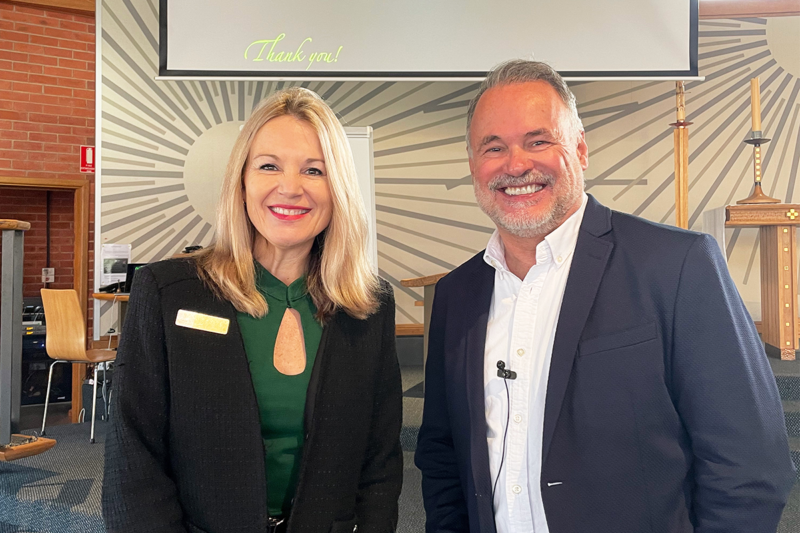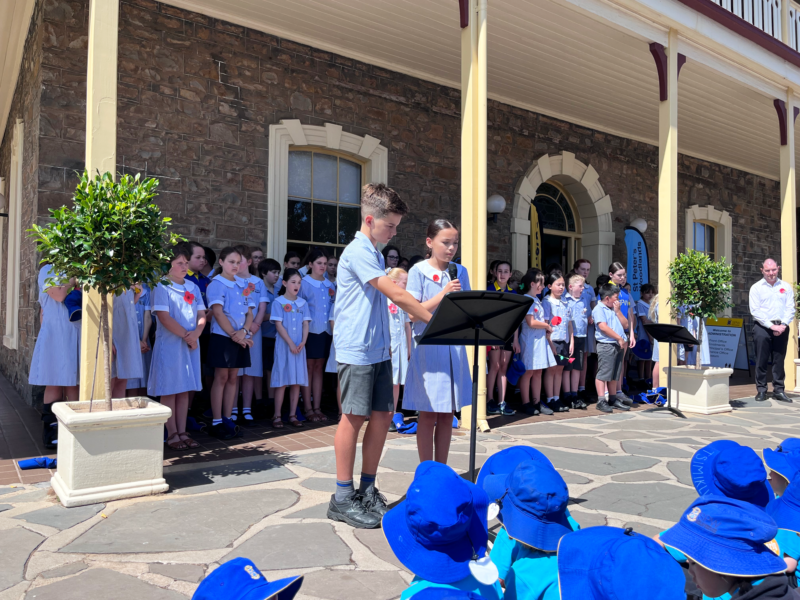The launch of Project RISE, our new bespoke learning framework.
Like all professions, the way teachers teach and structure their classrooms (called ‘pedagogy’) has evolved dramatically over the past 20 years.
New research and technology have collided to inform innovative teaching methods, techniques and curriculums, allowing us to set students up for success in an ever-changing world.
As thought leaders and way makers in primary education, 2023 marks a milestone in our school’s approach to teaching and learning, as we farewell the IB Primary Years Programme (IB PYP), and launch Project RISE.
Driven by new research about how children learn best, find out more about Project RISE, and what it looks like in practice.
Project RISE: Research-driven, Innovative, Student-centred, Extraordinary
One-and-a-half years in the making, Project RISE is a new, bespoke learning framework for Reception to Year 6 at St Peter’s Woodlands Grammar School.
It has been based around six enduring qualities — identified by parents, the school council, teachers and students — that we want to be enduring in our students long after their time at SPW.
These qualities are: Resilience, Problem Solvers, Critical Thinkers, Responsible Citizens, Empathetic, Collaborative.
Project RISE blends two teaching pedagogies: explicit instruction and inquiry learning (which features heavily in the IB PYP program) to teach the Australian curriculum and to develop and instill these qualities.
Explicit instruction is used to teach skills in literacy and numeracy and research. These skills are then put to good use in rich problem solving, authentic real world experiences and inquiry learning units.
“Explicit instruction is all about teaching in a direct and structured way. It involves breaking down complex skills and knowledge into smaller instructional tasks. Students are aware of what they are learning, why they are learning it and what success will look like,” Mrs Helen Finlay, Principal of St Peter’s Woodlands said.
“Whereas the inquiry approach encourages children to engage in critical and creative thinking so they can develop their abilities to ask questions, design investigations, form explanations and communicate findings. For children to be successful inquirers there needs to be considerable explicit instruction to teach the skills”
“So, you can see how the two fit beautifully together…they’re two pieces of a really holistic puzzle,” she said.

Rising up to a new educational framework
Like many schools, St Peter’s Woodlands’ decision to transition away from the IB PYP framework has been driven by robust research and supported by professional partnerships including Harvard University’s Project Zero and the science of learning, and our belief in the role of wellbeing in a child’s education.
“Many schools are moving away from the IB PYP framework for the same reasons,” Mrs Finlay said.
“The science of learning tells us that one of the key ways children learn best is through explicit teaching…the idea that children can learn through inquiry alone is just not the case anymore.”
Mrs Finlay also said that by encompassing wellbeing into the framework, St Peter’s Woodlands can provide a complete “wraparound” education for children.
“I wanted to develop a framework that was more holistic, that also encompassed things like wellbeing,” she said.
“It’s important to take into consideration that children aren’t just at school just to learn the Australian Curriculum — they’re humans, so we need to look at wellbeing, their sense of belonging, making social connections, and their place in the world.
“A good framework should be providing a complete ‘wraparound’ education for children, encompassing explicit instruction and the delivery of the curriculum, their wellbeing, and it should always come back to research of what we know works.”
The role of invested communities
Whether creating “authentic links” between home and school, or undertaking “service learning” with community organisations and groups, community plays an important role in Project RISE, said Mrs Finlay.
“We know that a very important part of a child’s education is an invested community,” she said. “We’re creating authentic links back to the home as part of Project RISE, so parents and caregivers can feel very much a part of their child’s education as well.
“Each week, parents and caregivers will get a summary of what their child has learnt in the past week, and what they’ll be learning about in the next.
“This helps parents feel really well informed on their child’s learning and they can actually ask more than, ‘what did you do at school today?’”
The value of service is embedded into children through the Service Learning component of Project RISE. Each year level group will be required to choose a cause they’re interested in, learn more about it, and take action.
“For example, children in the younger years might make a link to the koala hospital in the Adelaide Hills, learn all about the plight of koalas here in the Adelaide region due to the reduction in their habitat and other factors, maybe do some fundraising, and ultimately, learn through being of service to the community,” Mrs Finlay said.
“So from as young as five, the children are learning about the importance of serving others and being outwardly focused.
“All of this dovetails into the DARE Graduate Diploma in year six, where, instead of service learning as a cohort, they’re actually going out and doing their own community service.”

Measuring success
Formally launched in Term 1 2023, St Peter’s Woodlands will be collecting data throughout the year to measure the success and impact of Project RISE, seeking input from students, parents, teachers and industry professionals alike.
“Like any good framework, it’s not stagnant,” Mrs Finlay said. “It will be something that we’re continually refining, reviewing and evolving as the year progresses.
“We’ve got three formal data collection periods where we sit down with our whole team to look at the data of every individual child to make sure what we are doing is working.
“We also provide opportunities for parents and students to feed back to us about what’s working and what’s not.”
In July, Mrs Finlay will be presenting St Peter’s Woodlands work on Project RISE to a group of principals from all around the world at Harvard School of Education, providing further opportunity to glean insight from world-leading educators.
To learn more about the rich and varied education on offer at St Peter’s Woodlands, contact Ms Jo Gray, St Peter’s Woodlands Enrolments Manager.